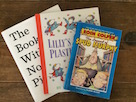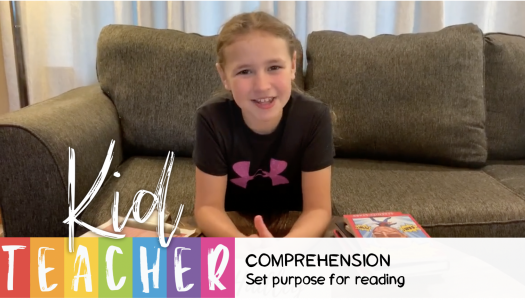Lori Sabo
Many years ago, when my son was in third grade, I walked into his room to tuck him in and found him distressed about the book he was reading (Shiloh by Phyllis Reynolds Naylor). He just couldn’t understand why a German man, who tends sheep for a living, would come out of nowhere to viciously attack and wound a dog.
When I looked at the passage, I saw German shepherd and immediately realized where his mental image and comprehension had taken a detour.
 More recently, my four grandsons were concerned about a bumblebee they discovered outside. My daughter, who is always careful not to be an alarmist, said, “Don’t worry. It has been there for about five minutes. It’s just taking a little nap in the sun.” The three-year-old went right up to the creature, peered at it closely, and said, “I don’t see any zzzz’s.” We swallowed our laughter while realizing that every preschool book he’s ever read has shown zzzz’s above the head of its snoring character.
More recently, my four grandsons were concerned about a bumblebee they discovered outside. My daughter, who is always careful not to be an alarmist, said, “Don’t worry. It has been there for about five minutes. It’s just taking a little nap in the sun.” The three-year-old went right up to the creature, peered at it closely, and said, “I don’t see any zzzz’s.” We swallowed our laughter while realizing that every preschool book he’s ever read has shown zzzz’s above the head of its snoring character.
While shopping together, I told my friend I wanted to try quinoa. She giggled before telling me, “It’s pronounced keen-wah, not quin-oh-uh.” Really? Why on earth would they spell it that way?
It is in conversations that misconceptions come to light, and it’s one reason we need to be committed to one-on-one conferring and providing time for our students to talk with each other about books. Misconceptions about pronunciation and comprehension are ferreted out and clarified, and the level of accuracy and understanding is raised.
If you’re not yet comfortable with one-on-one conferring, let me encourage you to just get in there: just get in there and talk with your students about what they are reading. Listen and learn. If you care about them, and care about who they are as readers, it won’t be hard to engage in this kind of casual conversation. Teachable moments will begin to unfold. Start keeping track in a conferring notebook and you’ll have a record of teachable moments and a guide to making future conversations and teaching intentional, timely, and beneficial.
It doesn’t matter if we are age three, in third grade, or well beyond our 30s: there is much to be gained by talking about what we read.
News from The Daily CAFE
 Library Love . . .
Library Love . . .
The Importance of the Classroom Library
Susan B. Neuman shares valuable research and information on the vital importance of our classroom libraries and explains how we can make ours most effective.
 Daily 5 . . .
Daily 5 . . .
Keeping Track of Read-to-Someone Numbers*
Here are some ways to keep track so you'll know when this popular choice is full for the round.

Story Corner . . .
50 Back-to-School Books
We selected these books to help you build a sense of community, teach reading strategies, and share mentor texts.
 Focus on Health . . .
Focus on Health . . .
Celebrate Learning to Jump
Carol Moehrle reminds us to celebrate approximations.




